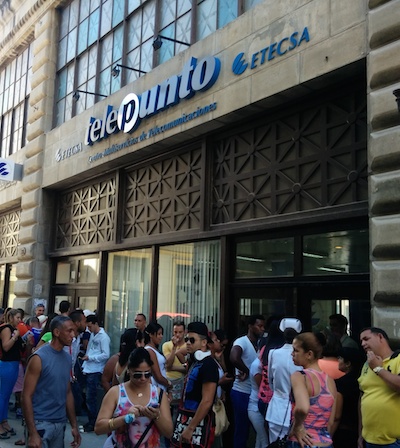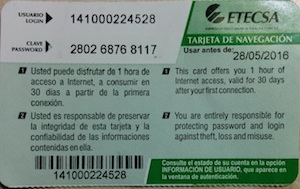|
Today's Opinions, Tomorrow's Reality
Surfing Like It's 1999 By David G. Young Havana, February 20, 2015 -- Only the luckiest in Cuba can access the internet. My smartphone hates Cuba. Each morning it admonishes me that it has not been able to back up in several days. No internet connection is available, it says. As if I didn't know. Access to the internet in Cuba is extremely limited. With very rare exceptions, scanning for WiFi networks always brings up a blank page. Laptops are periodically seen, but information exchange is typically by DVD or memory stick. I tried several times to get on the internet without success. Government Etecsa offices, run by the Communications Ministry, provide paid access for foreigners, but the lines are long, and the queues are either outside or in buildings with all the charm of the department of motor vehicles.
I tried going to Dulcinea, a private cafe in the colonial city of Trinidad that sells access. But only two of its ten machines were functioning and a half dozen foreigners were waiting to use them. Cubans are used to waiting in long lines for the basics of life. I am not. At the Iberostar hotel in Havana, the business center rents terminals for $4 per hour. Foreigners are sold scratch cards issued by the same Etecsa office with the long queues. Six working machines were available on my first visit. Only five people were waiting in line. In Cuba, that's a great deal! The guy next to me as I waited was sporting a Che Guavera patch on his jacket. Was this supposed to be ironic? Was he not frustrated that this communist religious icon helped spawn a repressive system with one of the lowest internet penetration rates in the world? Vive la revolution! When I finally got online, it was like it was 1999. A modified Internet Explorer was the default browser. The dusty old desktop had a keyboard and a trackball mouse. Access to my Google-hosted work mail was denied. I should consider myself lucky. The next day when roaming the tropically leafy campus of the University of Havana, I chatted with two second-year history students, who pointed out the library to me. "It has computers with internet, but we can't use them," one said. They are only available for Americans studying abroad, they said.
Blocking access to the internet is probably best for their future studies. Their last two years of their history program is focused on the study of Castro's revolution, they said. Knowledge they might learn on the open internet could be very bad for their grades. While internet access is denied to Cubans, basic cell phones are increasingly common. Elite Cubans with access to hard currency (the convertible pesos known as Cucs), can even buy smartphones. Android models made by Samsung seem particularly popular. As of December, Cubans with these phones can even get email access through Etecsa. But access to the web, app stores, and other aspects of the modern world are all prohibited. With this in mind, these internet-free smart phones aren't so smart -- they are basically PDA phones like the old Palm Pilots or Blackberries back in 1999. I'll bet these smart phones hate Cuba, too. Related Web Columns: Barely Rattling Along, February 23, 2015 The Never Ending Party, October 16, 2012 Invading the Next Frontier America Libre, March 24, 1998 |



